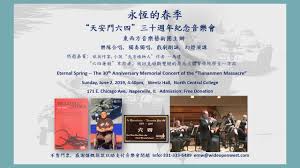
2019年06月11日 9:11 PDF版 分享转发
(Followed by English)
A brief video presentation of the 30th Anniversary Memorial Concert
“天安门六四”三十周年纪念音乐会节选视频
父亲在2011年圣诞之夜於上海离世的时候﹐我们已有十八年没有相见了。他曾在电话里对我说﹕“女儿啊﹐我来日不多了﹐你就改变
一下政治观点吧﹗这样你就可以回来看我了。你是我最小的女儿﹐你知道我有多想你啊﹗”父亲的话像刀一样深深刺痛了我的心。难道我不思念他吗? 难道我不想见他吗﹖是父亲把我带进了古典音乐的圣殿。他是我的第一个音乐老师﹐在我还很小的时候就开始教我音乐理论﹑作曲和钢琴。而令我格外心痛的是, 原来父亲太懂得这个专制政权﹐即﹐如果你不改变政治立场﹐你就不可能安全地回故乡。可是﹐我反复地对自己说﹐原谅我﹐爸爸﹗我不能改变我的理念。正因为我是那样热爱生我的那片古老的土地和世代苦难的同胞﹐正因为我对你的爱﹐我不能改变。如果像我这样的人都抛弃原则﹐向专制杀人政权低头﹐那麽, 中国作为一个国家就永远不会改变﹐生活在那片土地上的人民和他们的孩子们就永远不能享受自由。
两年前﹐我收到了叔叔的一封信﹐信中附有父亲遗留的一页音乐创作的手稿﹐这便成了我仅有的能寄托我对父亲哀思的珍贵物件, 也是“永恒的春季”的创作灵感的源泉。这首作品采用了拱形结构﹐在作品的开始与结尾﹐你们将听到父亲的曲调在钢琴上远远地传来。作品的中段是以父亲的另一个曲调在弦乐上展开。这首乐曲是我的纪念与缅怀﹐是我的期待与信念。
“六四”给中国留下了不可愈合的伤痕﹐也给千万个家庭造成了永久的悲剧。我所经历的伤痛﹐正是无数个家庭悲剧中的一幕。在纪念“六四”三十周年的今天﹐我要把此曲献给为自由中国捐躯的先烈﹐献给为正义与自由而付出了个人代价的志士仁人﹐献给那些在三十年前经历了丧子丧夫之痛的“天安门母亲”。让我们祈祷祝福——在人间﹐在天国﹐或重洋远渡﹐或日月相隔﹐愿所有被迫分离的破碎的心终将重逢在自由天空下的永恒的春天。
【附一】“永恒的春季”(杨逢时词曲)﹕
仰望苍天我在寻你﹐
走近大海我在唤你。
那风吹的云﹐那水照的影﹐
只留下你孤独的歌伴随我破碎的心。
仰望苍天我在寻你﹐
走近大海我在唤你。
冷酷的严冬﹐悲情的分离﹐
但我们终将会相聚在永恒的春季。
--------------------------------------------------------------------------------------------------
【附二】英文原稿
Reunite in Eternal Spring –
Fengshi Yang’s Remarks at “Tiananmen June 4th” The 30th Anniversary Memorial Concert
My father passed away in my hometown of Shanghai on Christmas Eve of 2011. I had not seen him for a long 18 years when he died. He once begged me: “Daughter, please just change your political view so you can comeback to visit me. I do not have many years left. You are my youngest child. I miss you so much…”
His words were like a sharp knife stuck in my heart. The pain has been excruciating ever since. How could I not miss him? How could I not want to visit him? He is the one who brought me into the world of classical music.He is my very first music teacher. He taught me music theory, composition and piano when I was very little.
My heart was also hurt because I know how well he actually understands the nature of the communist regime,a regime that makes it impossible to return to China without changing your mind.
I told myself over and over again: “I am so sorry father. I cannot change my mind. Because I love the people of China, I love that ancient beautiful land that gave me birth. And father, I love you so much that if people such as me were to abandon their principles and bow down to the totalitarian killing regime, then China, as a country, will never change. Our children and our grandchildren would forever live without freedom.
Two years ago I received a letter from my father’s brother who sent me a very brief manuscript of music that my father had left behind. That has become my only tangible treasure with which I can remember him. His short manuscript inspired me to write “Eternal Spring”.
“Eternal Spring” is based on an arch form. You will hear his musical theme far away in the piano in the beginning and at the end. A second musical theme is developed in the middle section by the strings. “Eternal Spring” is a piece of remembrance; is a piece of nostalgia; is a piece of hope and faith.
The Tiananmen June 4th Massacre has left deep cultural wounds in China. This massacre has created irreparable tragedy for thousands of families who have endured events similar to what I have experienced.
Today we assemble here to remember the Tiananmen June 4th. I dedicate this piece to all those who sacrificed their lives for a free China and for all who endured crushing personal costs for the sake of justice and liberty. We especially remember the Tiananmen Mothers who lost their precious children and other loved ones 30 years ago. We pray that one day all separated families will reunite in a shining free Eternal Spring.
——《纵览中国》首发 —— 转载请注明出处



![[冤旗与国旗同飞]策划者周志荣被逮捕](./smarty-4.5.5/mz/new_logo.jpg)